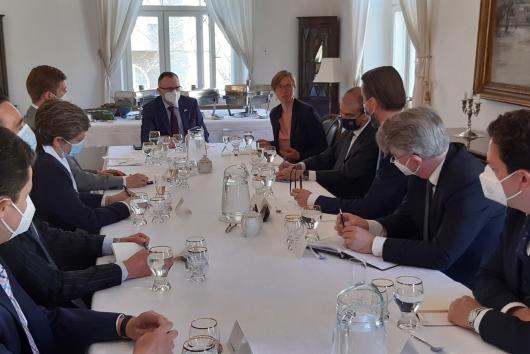
Round table on security and the future of the EU
13.05.2021 / 13:30 | Aktualizováno: 20.03.2024 / 17:19
On 12 May 2021, the Czech Embassy in Helsinki hosted a round table on the EU's strategic autonomy, the Strategic Compass and the Conference on the Future of Europe. The round table was attended by Sari Rautio, Director of the Security Policy Department of the Ministry of Foreign Affairs, Satu Keskinen, Director of the General Affairs Department of the Prime Minister's Office, and Henri Vanhanen, the Finnish Institute of International Affairs (FIIA) expert on foreign, security and defense policy. Also, the Ambassadors of Austria, Croatia, Estonia, France, Germany, Poland and Portugal participated in the event.
The event followed the publication of the Finnish government report on EU policy from February 2021, whereas the topics were chosen with regard to current developments and the overrun towards the Czech Presidency of the Council of the EU in 2022.
Finland supports a concept of strategic autonomy that strengthens the EU's autonomous capacity to respond to crises and cross-sectionally increases Member States' resilience to critical situations. The concept of strategic autonomy has been used for a long time in the EU context, but its scope is still gaining ground - recently it has been necessary to include, for example, the issue of technological autonomy. The Finnish perception of strategic autonomy avoids the reduction of ties with allies and partners, on the contrary, the purpose is the ability to do more together, take on more responsibility, cooperate and avoid protectionism.
According to Finland, the Conference on the Future of Europe should not lead to a change in primary acquis with its many unused instruments, but to a more inclusive and more open EU to citizens, reflecting Finland's long-standing national approach to EU affairs as such. In interaction with the public, Finland wants to focus on specific topics with a real impact on citizens' daily lives, such as security, sustainable development, migration, etc., but at the same time the topics must be set by the public itself, as it is not a government-driven process.




